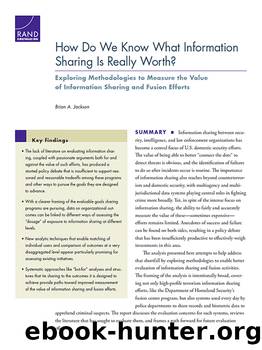How Do We Know What Information Sharing Is Really Worth? by Brian A. Jackson

Author:Brian A. Jackson [Jackson, Brian A.]
Language: eng
Format: epub
ISBN: 978-0-8330-8388-3
Publisher: RAND Corporation
Published: 2014-07-14T16:00:00+00:00
Evaluation at Implementation Versus Post Hoc Assessment
Addressing the problems in evaluating information sharing systems begins with the simple but important point that assessing a system that is already in place and being used is a different task from assessing a change in information sharing as the system is being implemented. In the latter case, there is an opportunity to determine specific data required to evaluate the effects of the system, make measurements before the system is put in place, and then compare that baseline with later performance. Even more sophisticated designs may be possible to further isolate the effect of the sharing system. Such designs might incorporate features such as randomized treatment groups (i.e., a subset of an agency that is given access to the system) and controls (a subset that is not given access until later).32 Evaluation efforts to assess a system that is already in place do not have these pre-implementation options, making the creation of control groups for comparison more difficult.
Potentially more important, planning for evaluation as a system is implemented also improves the likelihood that the data needed will be captured at all.33 These issues apply to all four of the classes of sharing efforts discussed previously, but they may be particularly problematic for expertise sharing efforts, which are frequently person-to-person activities and are thus potentially the least likely to automatically produce analyzable information for assessment. In view of this, evaluation methods are needed to assess the value of the many investments in information sharing that have already been made, in spite of the greater difficulty of doing so. Future information sharing investments could have evaluation requirements and resources built into the programs to provide the greatest potential for limiting the risk that a focus on implementation alone will make the value of the investments difficult to assess.
Download
This site does not store any files on its server. We only index and link to content provided by other sites. Please contact the content providers to delete copyright contents if any and email us, we'll remove relevant links or contents immediately.
What's Done in Darkness by Kayla Perrin(25500)
Shot Through the Heart: DI Grace Fisher 2 by Isabelle Grey(18219)
Shot Through the Heart by Mercy Celeste(18160)
The Fifty Shades Trilogy & Grey by E L James(17774)
The 3rd Cycle of the Betrayed Series Collection: Extremely Controversial Historical Thrillers (Betrayed Series Boxed set) by McCray Carolyn(13189)
The Subtle Art of Not Giving a F*ck by Mark Manson(12912)
Scorched Earth by Nick Kyme(11832)
Stepbrother Stories 2 - 21 Taboo Story Collection (Brother Sister Stepbrother Stepsister Taboo Pseudo Incest Family Virgin Creampie Pregnant Forced Pregnancy Breeding) by Roxi Harding(11040)
Drei Generationen auf dem Jakobsweg by Stein Pia(10217)
Suna by Ziefle Pia(10186)
Scythe by Neal Shusterman(9259)
International Relations from the Global South; Worlds of Difference; First Edition by Arlene B. Tickner & Karen Smith(8608)
Successful Proposal Strategies for Small Businesses: Using Knowledge Management ot Win Govenment, Private Sector, and International Contracts 3rd Edition by Robert Frey(8419)
This is Going to Hurt by Adam Kay(7695)
Dirty Filthy Fix: A Fixed Trilogy Novella by Laurelin Paige(6453)
He Loves Me...KNOT by RC Boldt(5804)
How to Make Love to a Negro Without Getting Tired by Dany LaFerrière(5378)
Interdimensional Brothel by F4U(5304)
Thankful For Her by Alexa Riley(5161)
